Mass General Next Generation Physician-Scientist Through Stimulating Access to Research in Residency Program (Mass General Next-Gen StARR)
About Us
Massachusetts General Hospital was awarded an R38 grant through the National Heart, Lung, and Blood Institute in Summer 2020. Residents started the inaugural year in the Mass General Next-Gen StARR program in July 2020. The program is led by Program Director Jay Vyas, MD, PhD (Medicine) in tandem with Program Manager Rebecca Ward, PhD (Medicine) and an Internal Steering Committee including Benjamin Medoff, MD (division chief, Pulmonary and Critical Care Medicine), Jay Rajagopal, MD (Broad Institute), Pradeep Natarajan, MD, MMSc, David Scadden, MD (Medicine), and Melissa Suter, PhD (Medicine).
The Mass General Next-Gen StARR’s mission is to train residents to be productive, independent physician-scientist who can advance medical science in regenerative medicine, cardiac and pulmonary biology from basic science to clinical investigation. The program brings together the Divisions of Cardiology and Pulmonary and Critical Care Medicine in the Department of Medicine to provide a research mechanism for up to 2 interested residents per year.
Follow us on Twitter: @MGHResScholar
Research Opportunities
Mass General has been at the forefront of medical and scientific innovation. The research budget at Mass General exceeded $1B in 2019, making Mass General home to the largest hospital-based research program in the United States. While this alone affords one a wide array of options, a key feature of the Mass General Next-Gen StARR program enables those who have not previously had expansive research opportunities previously or would like to learn new techniques/enter a different field to have protected research time. This NIH-funded program will provide protected time for individuals interested in pursuing medical research who may not have had an opportunity to gain necessary skills in the past or are moving into a new area of research. Regenerative medicine, cardiac biology, and pulmonary biology continue to be areas of pivotal importance in healthcare research. This program focuses primarily in 4 research areas: [1] Stem Cell Biology, [2] Cardiometabolic Biology, [3] Pulmonary Inflammation and [4] Genomics. Participants will conduct research in an NHLBI-funded lab.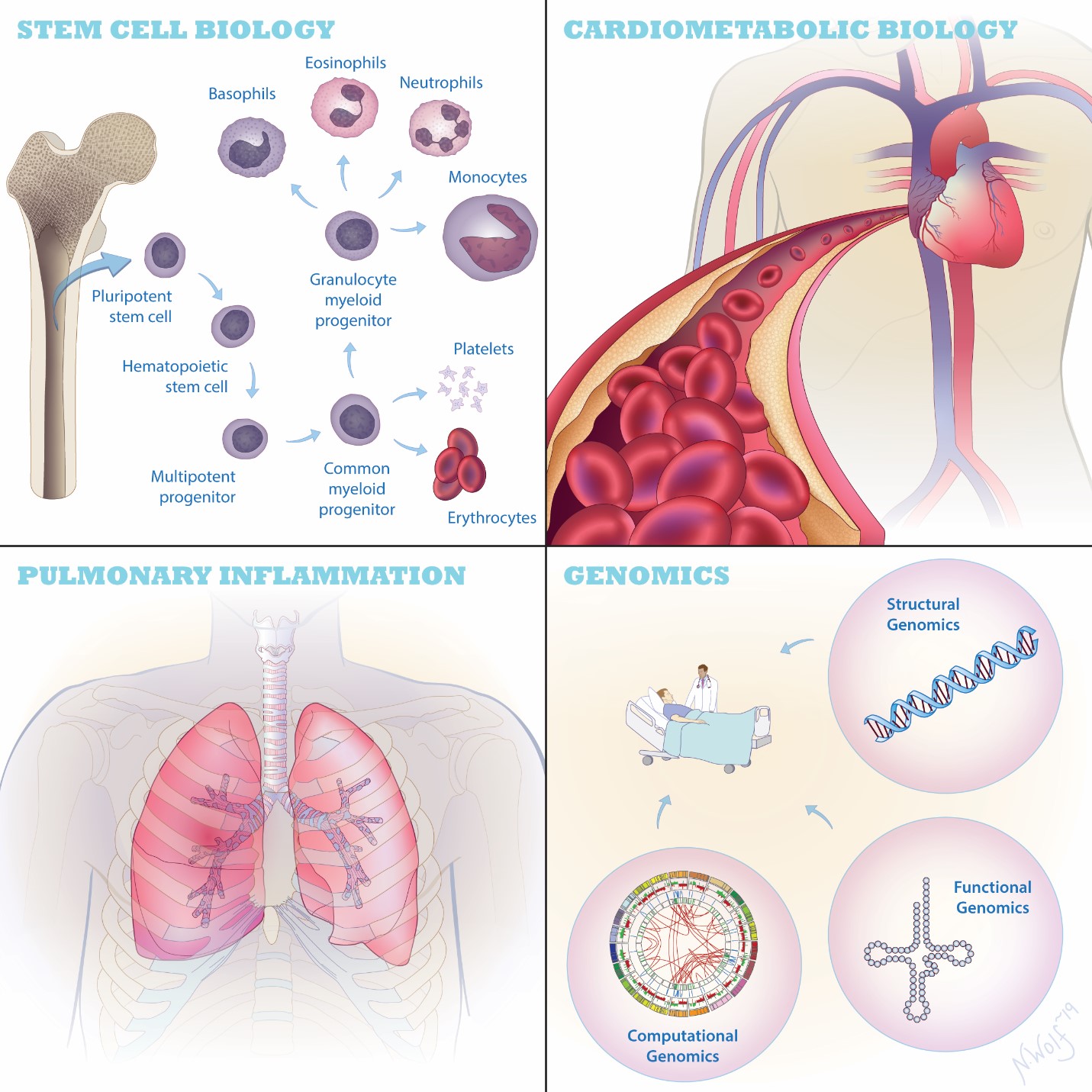
Mass General Next-Gen StARR Structure
Mass General Next-Gen StARR is designed to attract, train and retain physicians in biomedical investigation at one of the most critical juncture of their career—residency training. To accomplish this, we provide the opportunity to devote 12 months to research during residency to provide the necessary mentorship and professional development critical to succeed as a physician-scientist.
Mentorship
Residents are expected to put 80% effort toward closely mentored, independent research projects in an NHLBI-funded lab, with 20% effort toward ambulatory clinic to maintain clinical skills. At the beginning of the program, each participant will develop an individual development plan for their time in the program and beyond. Residents will meet weekly with their faculty mentor to discuss their research progress and professional development. In addition, Dr. Vyas and the Internal Steering Committee will meet twice annually with each resident.
Curriculum
Residents can tailor the program to develop research skills and professional development skills. All participants are required to complete Mass General Brigham Responsible Conduct of Research (RCR) curriculum and at least one course in biostatistics, grant writing and scientific communication each. Participants will have the opportunity to take courses offered through the Harvard Catalyst, Mass General Office of Research Career Development and Harvard Medical School. Participation in scientific meetings is highly encouraged at the institutional level (e.g. Mass General Annual Resident-Research Day) and international level.
Resident scholars will participate in monthly meetings that will cover career development topics and provide a platform to present their research. Topics may include mentoring, advocating for your career, science communication (grants and manuscripts), leadership skills, team science, and conducting research as an MD.
Financial Support
Participants will receive a stipend according to the Mass General Brigham PGY scale for the research year. Additionally, selected residents will have $10,000 to use towards materials and coursework, as well as $1,500 for travel expenses. The program will start on July 1st and last a year, with the option to re-apply for a second year.
Mass General Next Generation StARR Program Resident Scholar Profiles
The Department of Medicine’s Next-Gen StARR at Massachusetts General Hospital recruit residents from both departments to dedicate a year to research.
Participating Residents 2023-2024
 Shahzeb Hassan, MD
Shahzeb Hassan, MD
- Project Title: Conducting an Economic Evaluation of the Screen ASSIST Study
- Mentor: Douglas E. Levy, PhD, MPH (Medicine at MGH)
- Education: BA, University of Maryland, Baltimore County (2016); MD, Northwestern University Feinberg School of Medicine (2022)
- Clinical and Research Interests: Public health, social determinants of health, medical education
- Future Plans: Dermatology residency
 Akua Nuako, MD
Akua Nuako, MD
- Project Title: Outcomes Research of Advanced Therapeutic Endoscopy Procedures and Endoscopic Bariatric Therapies
- Mentor: Christopher Thompson, MD (Gastroenterology at BWH)
- Education: BA from Harvard College; MD from Washington University in St. Louis
- Clinical and Research Interests: Advanced endoscopy; bariatric endoscopy; obesity medicine
- Future Plans: GI Fellowship
Alumni
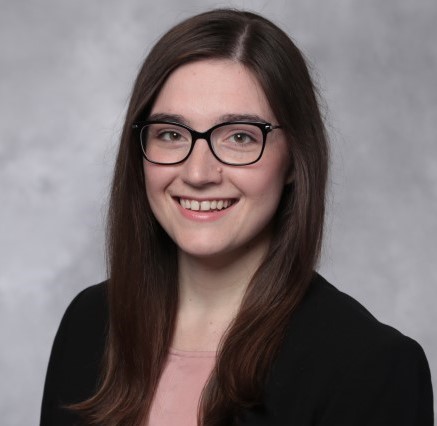
Elizabeth (Beth) Gay, MD (2022-2023)
- Project Title: Heterogeneity in Sepsis: Identification of Subgroups and Treatable Traits
- Mentor: Boyd Taylor Thompson, MD (Pulmonary & Critical Care Medicine at MGH)
- Education: BS and MD from University of Washington
- Clinical and Research Interests: Clinical trial design and implementation, pulmonary and critical care medicine, sepsis, biostatistics
- Future Plans: Pulmonology/Critical Care Fellowship

David J. Lee, MD, MPH, MMSc (2022-2023)
- Project Title: Understanding the Immunological, Genomic, and Epidemiological Links between Race, Obesity/Metabolic Dysregulation, and Multiple Myeloma and its Precursor States
- Mentors: Irene Ghobrial, MD (Medical Oncology at DFCI/HMS), Gad Getz, PhD (Center for Cancer Research at MGH/HMS, Broad Institute), and Timothy Rebbeck, PhD (Population Sciences at DFCI/HMS).
- Education: BA, University of California, Berkeley (2010); MD, Harvard Medical School (2019); MPH, Harvard T.H. Chan School of Public Health (2017); MMSc, Harvard Medical School (2019)
- Clinical and Research Interests: Hematologic malignancies, biomarkers, genomics, cancer prevention, and global health
- Future Plans: Hematology/Oncology Fellowship
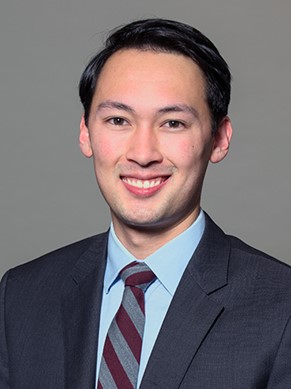
Adam Johnson, MD (2021-2022)
- Project title: Cellular Mechanisms of Vascular Calcification and Altered Vascular Compliance
- Mentor: Rajeev Malhotra, MD, MS (Cardiology at MGH)
- Education: BS from Johns Hopkins University; MD from Weill Cornell Medical College
- Clinical and Research Interests: Non-invasive cardiovascular imaging; cardiac critical care; genetics of vascular homeostasis; machine learning in cardiovascular imaging
- Current Position: Cardiology Fellowship (Cardiovascular Disease) at MGH
 Mike Kelly, MD (2021-2022)
Mike Kelly, MD (2021-2022)
- Project title: Environmental, Allergic and Infectious Triggers of Asthma in a School-Based Cohort
- Mentor: Peggy Lai, MD, MPH (Pulmonary & Critical Care Medicine at MGH)
- Education: BA from Colgate University; MD from University of Rochester School of Medicine and Dentistry
- Clinical and Research Interests: Better understanding predictors of asthma in children and adults, better understanding disparities in severity and treatment that exist in pulmonary diseases including asthma and COVID-19
- Current Position: Pulmonary and Critical Care Fellowship at Harvard
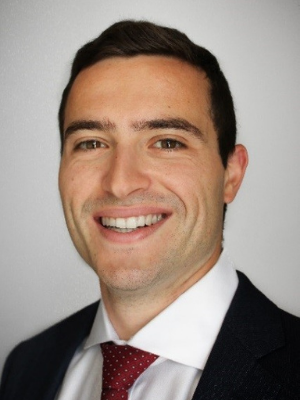 Julian Haimovich, MD (2020-2021)
Julian Haimovich, MD (2020-2021)
- Project title: Prediction of Cardiovascular Disease Using Artificial Intelligence on the Electronic Health Record
- Mentor: Steven Lubitz, MD, MPH (Cardiology at Mass General)
- Education: BS from Columbia University; MD from Albert Einstein College of Medicine
- Clinical and Research Interests: leveraging artificial intelligence to model and predict cardiovascular disease
- Current Position: Cardiology Fellowship (Cardiovascular Disease) at MGH

- Project title: Metabolite Profiles of Incident Cancer in the Framingham Heart Study
- Mentor: Jennifer Ho, MD, (Cardiology at Mass General)
- Education: AB from Harvard University (2008); MD, MPH from Tufts University School of Medicine (2017)
- Clinical and Research Interests: Cardiovascular disease prevention and epidemiology, sex differences in cardiovascular disease, women’s cardiovascular health, heart failure, heart failure with preserved ejection fraction, non-invasive cardiovascular imaging
- Current Position: Attending Hospitalist at MGH
Accomplishments of MGH Next-Gen StARR Recipients
Annual Newsletter | July 2022 Issue
Annual Newsletter | July 2023 Issue
Publications
- Kelly MS, Mohammed A, Okin D, Alba GA, Jesudasen SJ, Flanagan S, Dandawate NA, Gavralidis A, Chang LL, Moin EE, Witkin AS, Hibbert KA, Kadar A, Gordan PL, Bebell LM, Hauptman M, Valeri L, Lai PS. Preferred language mediates association between race, ethnicity, and delayed presentation in critically ill patients with COVID-19. Crit Care Explor. 2023 Jun 14;5(6):e0927. PMID: 37332365.
- Cowan A, Ferrari F, Freeman SS, Redd R, El-Khoury H, Perry J, Patel V, Kaur P, Barr H, Lee DJ, Lightbody E, Downey K, Argyelan D, Theodorakakou F, Fotiou D, Liacos CI, Kanellias N, Chavda SJ, Ainley L, Sandecká V, Pospíšilová L, Minarik J, Jungova A, Radocha J, Spicka I, Nadeem O, Yong K, Hájek R, Kastritis E, Marinac CR, Dimopoulos MA, Get G, Trippa L, Ghobrial IM. Personalised progression prediction in patients with monoclonal gammopathy of undetermined significance or smouldering multiple myeloma (PANGEA): a retrospective, multicohort study. Lancet Haematol. 2023 Mar;10(3):e203-e212. PMID: 36858677.
- Haimovich JS, Diamant N, Khurshid S, Di Achille P, Reeder C, Friedman S, Singh P, Spurlock W, Ellinor PT, Philippakis A, Batra P, Ho JE, Lubitz SA. Artificial intelligence-enabled classification of hypertrophic heart diseases using electrocardiograms. Cardiovasc Digit Health J. 2023 Mar 7;4(2):48-59. PMID: 37101945.
- Sutton NR, Malhotra R, St Hilaire C, Aikawa E, Blumenthal RS, Gackenbach G, Goyal P, Johnson A, Nigwekar SU, Shanahan CM, Towler DA, Wolford BN, Chen Y. Molecular mechanisms of vascular health: insights from vascular aging and calcification. Arterioscler Thromb Vasc Biol. 2023 Jan;43(1):15-29. PMID: 36412195.
- Shah UA, Whiting K, Devlin S, Ershler R, Kanapuru B, Lee DJ, Tahri S, Gwise T, Rustad EH, Mailankody S, Lesokhin AM, Kazandjian D, Maura F, Auclair D, Birmann BM, Usmani SZ, Gormley N, Marinac CR, Landgren O. Extreme body mass index and survival in newly diagnosed multiple myeloma patients. Blood Cancer J. 2023 Jan 12;13(1):13. PMID: 36631444.
- Takvorian KS, Wang D, Courchesne P, Vasan RS, Benjamin EJ, Cheng S, Larson MG, Levy D, Ho JE. The association of protein biomarkers with incident heart failure with preserved and reduced ejection fraction. Circ Heart Fail. 2023 Jan;16(1):e009446. PMID: 36475777.
- Singh P, Haimovich J, Reeder C, Khurshid S, Lau ES, Cunningham JW, Philippakis A, Anderson CD, Ho JE, Lubitz SA, Batra P. One clinician is all you need-cardiac magnetic resonance imaging measurement extraction: deep learning algorithm development. JMIR Med Inform. 2022 Sep 16;10(9):e38178. PMID: 35960155.
- Kelly MS, Bunyavanich S, Phipatanakul W, Lai PS. The environmental microbiome, allergic disease and asthma. J Allergy Clin Immunol Pract. 2022 Jun 21: S2213-2198(22)00591-8. PMID: 35750322.
- Banzon TM, Kelly MS, Bartnikas LM, Sheehan WJ, Cunningham A, Harb H, Crestani E, Valeri L, Greco KF, Chatila TA, Phipatanakul W, Lai PS. Atopic dermatitis mediates the association between an IL4RA variant and food allergy in school-aged children. J Allergy Clin Immunol Pract. 2022 May 16: S2213-2198(22)00487-1. PMID: 35589010.
- Khurshid S, Reeder C, Harrington LX, Singh P, Sarma G, Friedman SF, Di Achille P, Diamant N, Cunningham JW, Turner AC, Lau ES, Haimovich JS, Al-Alusi MA, Wang X, Klarqvist MDR, Ashburner JM, Diedrich C, Ghadessi M, Mielke J, Eilken HM, McElhinney A, Derix A, Atlas SJ, Ellinor PT, Philippakis AA, Anderson CD, Ho JE, Batra P, Lubitz SA. Cohort design and natural language processing to reduce bias in electronic health records research. NPJ Digit Med. 2022 Apr 8;5(1):47. PMID: 35396454.
- Liu EE, Suthahar N, Paniagua SM, Wang D, Lau ES, Li SX, Jovani M, Takvorian KS, Kreger BE, Benjamin EJ, Meijers WC, Bakker SJL, Kieneker LM, Gruppen EG, van der Vegt B, de Bock GH, Gansevoort RT, Hussain SK, Hoffmann U, Splansky GL, Vasan RS, Larson MG, Levy D, Cheng S, de Boer RA, Ho JE. Association of cardiometabolic disease with cancer in the community. JACC CardioOncol. 2022 Mar 15;4(1):69-81. PMID: 35492825.
- Jovani M, Liu EE, Paniagua SM, Lau ES, Li SX, Takvorian KS, Kreger BE, Splansky GL, de Boer RA, Joshi AD, Hwang SJ, Yao C, Huan T, Courchesne P, Larson MG, Levy D, Chan AT, Ho JE. Cardiovascular disease related circulating biomarkers and cancer incidence and mortality: is there an association? Cardiovasc Res. 2021 Sep 1: cvab282. PMID: 34469519.
- Khurshid S, Weng LC, Al-Alusi MA, Halford JL, Haimovich JS, Benjamin EJ, Trinquart L, Ellinor PT, McManus DD, Lubitz SA. Accelerometer-derived physical activity and risk of atrial fibrillation. Eur Heart J. 2021 Jul 1;42(25):2472-2483. PMID: 34037209.
- Lau ES, Paniagua SM, Liu E, Jovani M, Li SX, Takvorian K, Suthahar N, Cheng S, Splansky GL, Januzzi JL Jr, Wang TJ, Vasan RS, Kreger B, Larson MG, Levy D, de Boer RA, Ho JE. Cardiovascular risk factors are associated with future cancer. JACC CardioOncol. 2021 Mar;3(1):48-58. PMID: 33870217.
- Khera R, Haimovich J, Hurley NC, McNamara R, Spertus JA, Desai N, Rumsfeld JS, Masoudi FA, Huang C, Normand SL, Mortazavi BJ, Krumholz HM. Use of machine learning models to predict death after acute myocardial infarction. JAMA Cardiol. 2021 Jun 1; 6(6):633-641. PMID: 33688915.
Selected Presentations
- Gay EA, Bartek B, North CM, Lee H, Schmidt EP, Shapiro NI, Calfee CS, Thompson BT, Matthay MA, Sinha P. Heterogeneity of effect in fluid resuscitation: a retrospective analysis of sepsis subtypes in the CLOVERS randomized controlled clinical trial. Poster Presentation at the Critical Care Congress Meeting, January 2024.
- Lee DJ. Prevalence of Monoclonal Gammopathies Detected by Mass Spectrometry and their Risk Factors among Black Africans in South Africa. Oral Presentation at the InterLymph Annual Meeting, June 2023.
- Lee DJ, El-Khoury H, Alberge J, Sakrikar DJ, Barnidge D, Perkins MC, Harding S, Perry J, Davis MI, Amstutz J, Horowitz E, Rebbeck TR, Ghobrial IM, & Marinac CR. Obesity, metabolic comorbidities, and lifestyle factors and their association with monoclonal gammopathies in a high-risk screened population: results of the PROMISE U.S. nationwide screening study. Poster presentation at the American Association of Cancer Research Annual Meeting; April 2022.
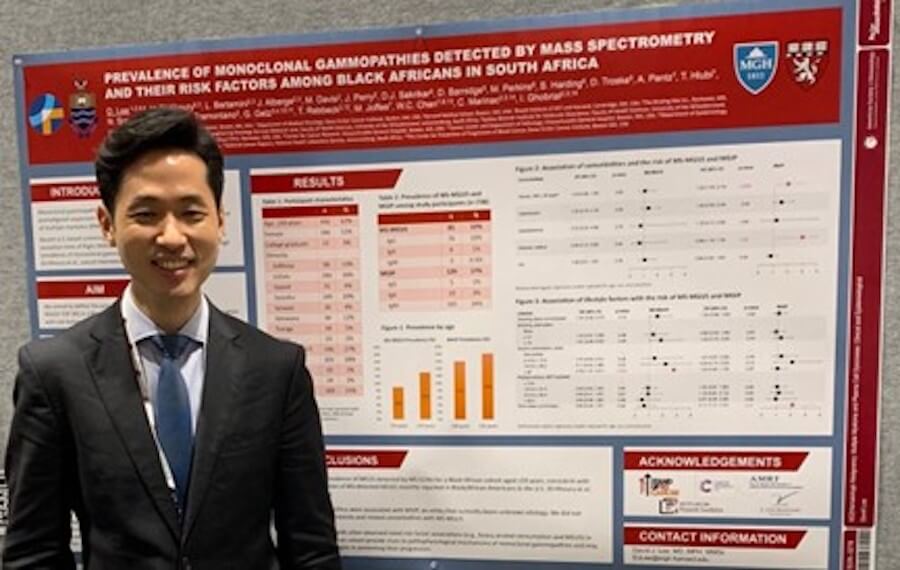
- Johnson A, Morales MA, Wooster LT, Li RH, Boerboom SL, Ostrom K, Sigurslid H, Jiang W, Tian W, Zeghibe A, Singh K, Barnes HJ, Lino Cardenas CL, Lee S, Yu PB, Miller CL, Nguyen CT, Malhotra R. Pulmonary artery pulsatility measured by cardiac magnetic resonance imaging in over 42,000 participants reveals novel genetic risk loci. Poster presentation at the Armstrong Transformation in Medicine Lectures; May 2022.
- Kelly MS, Mohammed A, Okin D, Alba, Ga, Jesudasen SJ, Dandawate NA, Gavralidis A, Chang LL, Moin EE, Witkin AS, Hibbert KA, Kadar A, Gorgan PL, Bebell LM, Lai PS. Preferred language mediates association between race, ethnicity and delayed presentation to care in critically ill patients with COVID-19. Oral Presentation at the American Thoracic Society International Conference; May 2022.
- Haimovich J, Khurshid S, Di Achille P, Nauffal V, Singh P, Reeder C, Harrington L, Wang X, Sarma G, Kornej J, Benjamin EJ, Philippakis AA, Batra P, Ellinor PT, Lubitz SA. Frequency and outcomes of bradyarrhythmias in the community. Poster Presentation at the American Heart Association Annual Meeting 2021, Scientific Sessions; November 2021.
- Takvorian K, Wang D, Larson M, Corchesne P, Levy D, Ho JE. The association of protein biomarkers with incident HFpEF versus HFrEF. Poster session presented at: American College of Cardiology’s 70th Annual Scientific Session & Expo; May 16, 2021.
- Haimovich J. Machine learning to improve prediction of mortality following acute myocardial infarction (“how much juice can ML squeeze”). Broad Institute; April 23, 2021
Awards and Honors
- David Lee
- Scholar-in-Training Award, American Association for Cancer Research (2022)
- Hematology Opportunites for the Next Generation of Research Scientists (HONORS) 2023-2024
Application Process
Applications are due in early December. Selected residents will be notified by February 1st. Per NIH requirements, applicants must be a U.S. Citizen or Permanent Resident. Residents in the Department of Medicine are eligible for the program between their PGY1 and PGY2 years or PGY2 and PGY3 year. We will consider proposals from applicants who wish to do this at the end of their PGY3 year.
Application
- Name
- Please answer the following (250-word limit each)
- What motivates you to engage in research?
- How will you use your time in the MGH Next-Gen StARR program?
- What do you want to get out of the Mass General Next-Gen StARR program?
- If you know, with whom are you interested in working during your time in the program?
- Applicant CV
- Mentor letter – An email should be sent to the Program Manager from your proposed primary mentor(s) with the title “R25 Application for [resident’s name]”. This email should include the broad objectives of the general project you will be working on and milestones for the resident at the end of the research year. This should be no more than a paragraph. The email should be submitted by the application due date.
For more information, please see our FAQ below or contact Dr. Rebecca Ward via email
Mass General Next-Gen StARR Frequently Asked Questions
Who should consider this pathway?
The Mass General Next-Gen StARR is designed for internal medicine residents who are interested in pursuing research during residency in regenerative medicine, cardiometabolic diseases and pulmonary biology.
What type of research can be supported?
The program spans the biomedical continuum to support residents pursuing basic science, pre-clinical research, pharmacokinetics, clinical or outcomes research.
I am interested in research, but do not know if I want to make it the focus of my future career. Is Mass General Next-Gen StARR right for me?
One of the goals of this program is to provide the opportunity for residents interested in research to assess whether a career in academic medicine is right for them. Candidates should have interest to devote a full year to research-related activities.
What if I am interested in researching diseases outside of regenerative medicine, cardiac or pulmonary biology?
This R38 program is funded through the National Heart, Lung, and Blood Institute (NHLBI). Thus, Mass General Next-Gen StARR residents must identify at least one research project during their research year relevant to their mission (e.g. cardiac, vascular, pulmonary or hematologic health). It should be noted that this program is not restricted to residents planning on becoming cardiology, pulmonology or hematology subspecialists.
What is the time commitment?
The program allows for 12 months of dedicated research time, during which time you will still be considered a resident. Starting July 1st, resident scholars will commit 80% effort towards their research project with the remaining 20% towards continuity clinic to preserve clinical skills. This program extends the overall time in residency by one year.
Is the program ABIM-approved?
Yes, we have received ABIM approval of the Mass General Next-Gen StARR.
How does the R38 differ from the ABIM short-track clinical investigator pathway (CIP)?
Short-tracking is an ABIM-approved mechanism in which two years of clinical residency in internal medicine is followed by a clinical year of subspecialty fellowship to enable more dedicated research time as a fellow. These individuals typically have MD, PhD degrees or an MD with substantial research experience prior to residency. This Mass General Next-Gen StARR program is designed for residents who want to engage in research that may not have expansive prior experiment. This program is open to both MD alone as well as MD, PhD candidates.
Will my salary change during the program?
No, the R38 salary is based on the Mass General Brigham PGY scale.
What are the other advantages to the Mass General Next-Gen StARR program?
The NIH announce a new K38 program to support research during fellowships. This funding opportunity will only be open to trainees who have been appointed to an R38 grant. Thus, appointment to the R38 will likely increase your chances of obtaining your own NIH funding in the future.
How do I apply?
Look for a formal call for applications in October. Applications will be available through REDCap. The deadline for applications will be December 1st.
I am a Mass General resident from another department. Can I apply to be a resident scholar through the Mass General Next-Gen StARR program?
While residents from other departments may be considered, we will need to ensure the resident’s programs/departments can provide the required support and confirm eligibility with their respective boards in their discipline.
I am interested in obtaining an MPH or other master’s degree relevant to medical research. Can I use this program to pursue this?
Per NIH guidelines, R38 funds cannot be used towards tuition for degree programs. However, R38 funds may be used to pursue structured training programs that provide a strong foundation to conduct research (e.g. courses in grant writing, methodologies, scientific communication, leadership workshops, etc.).
Am I eligible for extra shifts in the clinic?
Participating residents are still part of the residency program and thus, are eligible to work extra shift if desired.
Who should I contact if I still have questions?
Please send any additional questions regarding the Mass General Next-Gen StARR pathway to the Program Manager, Rebecca Ward, PhD.
Our Faculty and Staff
 Jay Vyas, Program Director
Jay Vyas, Program Director
 Rebecca Ward, Program Manager
Rebecca Ward, Program Manager
We have 46 mentors who have agreed to participate in the Mass General Next-Gen StARR program. Our mentors span the Mass General Departments of Medicine Anesthesia, Radiology and Regenerative Medicine, as well as the Broad Institute. If there is a faculty research mentor with relevant research interests that is not listed, you may propose the individual to program leadership.
Internal Medicine Residency Program
For more than 75 years, our program has brought experience, commitment and a rigorous and balanced approach to the training.
